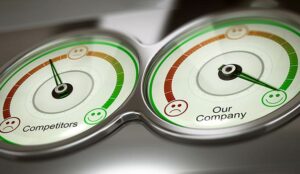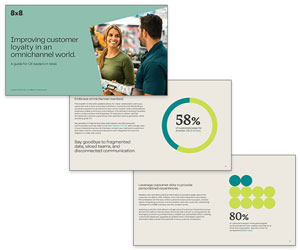Call centre benchmarking is the process of measuring your organization’s outcomes against its own historical performance – or against your competitors’ performance.
Benchmarking is a critically important tool for business leaders who want to improve their contact centre outcomes and retain engaged employees who are excited about assisting your customers.
Measuring how well your team is performing on a regular basis can help you identify areas where you have the opportunity to improve and help you set realistic goals.
In this article Meg Monk explains the fundamental aspects of contact centre benchmarking.
Types of Call Centre Benchmarking
In general, there are two types of benchmarking:
- Competitive Benchmarking is the process of taking stock of your call centre’s performance and comparing your numbers against those of similar companies in your industry.
- Process Benchmarking is less frequently used but involves comparing your organization’s processes and workflows against other sectors to look for blind spots and opportunities for improvement.
Top Call Centre Metrics and KPIs

There are lots of call centre metrics you could use to measure your performance, and various leaders throughout your company will likely be interested in different types of data.
For example, your executive team will want strategic metrics and KPIs to build the business case for things like department budgets and headcount.
Contact centre managers, on the other hand, might be more interested in data like Average Handle Time and First Call Resolution, as those metrics are directly tied to their performance.
Some of the most commonly used call centre metrics include:
- Average Handle Time (AHT) – this metric tracks the average of how long it takes your agents to resolve a customer’s concern, from the time the call connects until the call is ended.
- Net Promoter Score – how likely a customer is to recommend your company to their friends and family.
- Service Level – this is the percentage of calls answered within a specific number of seconds. In other words, how quickly your customers can expect to receive service when they enter your queue.
- Average Call Abandonment Rate – how many callers hang up or leave the queue before being connected to an agent.
- Average Time in Queue – like the name suggests, this metric tracks how long customers spent waiting before connecting to an agent.
- First Call Resolution – this metric tracks the percentage of concerns that were resolved without having to transfer, escalate, or return the call.
- Occupancy Rate – the percentage of agents who are actively taking calls or working on tasks related to calls.
- Average Speed of Answer (ASA) – the average time it takes for an agent to answer a call.
To learn more about what metrics can help measure Customer Experience (CX), read our article: The Top 10 Customer Experience (CX) KPIs for 2023
Tips for Benchmarking Success
The most important key to successful call centre benchmarking is to tie your benchmarks back to your wider company goals or KPIs. It’s great to know your company’s Average Handle Time, but if that number doesn’t relate to a specific company goal, it becomes just another number.

“What you are going to find is that you have two or three key goals for which you can benchmark metrics, in order to gauge current performance and track it over time,” said Justin Robbins, call centre educator and evangelist at 8×8.
“By creating these goals, we can focus our energies on benchmarking the metrics that matter most, and measure the impact when we introduce new and alter current processes to improve performance.”
The second key to successful benchmarking is to start with what you know. Your own internal metrics, such as your current employee engagement rate, are much easier to find and track than your competitors’ metrics, and they’ll likely be more useful as you’re starting out.
It’s also much easier to improve on your own performance than it is to try to compete with another organization whose processes you’re not familiar with and can’t control.
Lastly, use competitive intelligence to help you set initial goals and parameters. Industry reports can help you compare your internal benchmarks against industry averages to help you get a better understanding of how your organization is performing overall.
Sponsorship opportunities within these reports can also be great opportunities for marketing and brand recognition.
Common Benchmarking Mistakes to Avoid
There are several common pitfalls that organizations encounter when they begin benchmarking.
Setting Unrealistic Goals
The first and most obvious mistake is setting unrealistic goals the first time they benchmark their performance.
It’s great to be aggressive in your efforts to improve, but goals that are unattainable lead to employee burnout and dissatisfaction.
Contact centre goals and KPIs should be challenging and aspirational, but should also be achievable.
Only Comparing to Those Bigger or Smaller Than You
Secondly, only compare your organization to similar organizations when setting competitive benchmarks. Comparing your small 500-person company to a global organization with thousands of employees and limitless resources won’t help you meaningfully move the needle.
Focusing on competitors that are a similar size and in similar growth phases will be most useful and effective as you’re starting out.
Adopting Fear Tactics
Finally, avoid using benchmarks and KPIs as a fear tactic. If employees are stressed about losing their jobs if they fail to reach goals, they’ll lose motivation and engagement, leading to call centre attrition.
Instead, reward employees and teams for making progress toward departmental and organizational goals.
5 Essential Steps of Contact Centre Benchmarking
Congratulations! You now understand the basics of benchmarking and you’re armed with tips for success. You’re now ready to begin the process of measuring your call centre’s performance.
Here’s how to get started:
- Decide which metrics (KPIs) you want to measure – You can’t measure everything, so decide what areas of your call centre operations are most important. Be sure to tie the metrics you choose back to company goals.
- Begin by benchmarking against known metrics – If you’re already measuring things like First Call Resolution and Time in Queue, you can start measuring your progress against these initial benchmarks. You’re halfway there!
- Start collecting data – You may decide you want to use Quality Assurance (QA) software to make for easier performance tracking and reporting.
- Regularly analyse your data and make your findings available to your internal team – If you find particularly impressive numbers, you may also decide to use them for marketing purposes. You’ll find which cadence works best for your organization, but in general, contact centres tend to track metrics week to week, and then share benchmarks with the wider organization on a monthly or quarterly basis.
- Monitor your KPIs – Continue monitoring your KPIs over time as you implement new strategies to catch trends and make adjustments.
With thanks to Meg Monk
If you are looking for more great information on contact centre benchmarking and metrics, read these articles next:
- Contact Centre Benchmarking vs. Balanced Scorecard: Which Is Best?
- Are Your Team Leaders Too Busy Chasing Metrics?
- Call Center Metrics: Examples, Tips & Best Practices
Author: Guest Author
Reviewed by: Megan Jones
Published On: 5th Sep 2023 - Last modified: 23rd Sep 2025
Read more about - Call Centre Management, 8x8, Benchmarking, Justin Robbins, Key Performance Indicators (KPIs), Management Strategies, Metrics

















